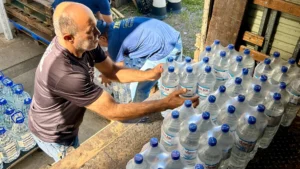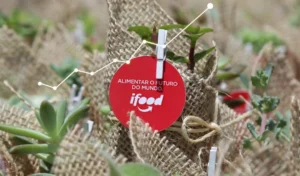Electric motorcycles and bicycles, robots and drones are part of the plan to make delivery sustainable
With new electric motorcycles, expansion of shared bicycles and authorization to do drone deliveries, iFood started 2022 by accelerating the adoption of cleaner means of transport in delivery.
All these new features are part of a bigger plan. Increasing the amount of non-polluting modes is a key strategy for iFood Regenerates, which is committed to making the company's operations neutral in CO2 emissions by 2025 and making 50% of deliveries using clean modes.
“The big challenge of building sustainable delivery is how to have a high-quality delivery model with a lower environmental impact. In this way, reducing everything from the emission of pollutants from vehicles to the use of plastic in packaging”, summarizes Alexandre Lima, sustainability manager at iFood.
To get there, he explains that iFood works on three fronts in relation to CO2. Offsetting gas emissions that contribute to global warming, reducing these emissions in everyday life and environmental regeneration.
Emissions compensation
Since July 2021, iFood has been compensate for CO2 emissions in advance of all its deliveries (i.e., when the order reaches the customer, the emission of pollutants along that route has already been neutralized).
In general, companies expect to close the balance sheet for the year to compensate for the following year, but the foodtech does it differently. “As we have data on sales expectations, we make a preliminary calculation and compensate”, explains Alexandre. “The logic is: the order arrived, iFood has already compensated.”
In 2021, the carbon credit purchases to neutralize the deliveries were directed to Amazon preservation projects. In 2022, iFood has already purchased credits to offset emissions from the first months and also started directing them to projects to encourage renewable energy.
Emissions reduction
Compensating is necessary, explains Alexandre, but first it is necessary to look for alternatives to reduce the emission of gases that contribute to global warming. That's where the electric motorcycles and bicycles enter the story.
“Reducing emissions is the heart of the goal of reaching 50% of deliveries in non-polluting modes in 2025”, says Alexandre. “And it also connects with compensation: the more we have clean deliveries, the less we need to buy carbon credits to offset pollutant emissions.”
In 2022, the tactic is to invest in non-polluting delivery vehicles —especially electric ones. “We have embarked on a journey of 'electrification' to further reduce emissions in deliveries with the maturation of electric motorcycles, the expansion of bicycles and the use of drones It is autonomous robots”, lists Alexandre.
By the end of the year, 10 thousand electric motorcycles should be in circulation, avoiding the emission of 30 thousand tons of CO2 into the atmosphere. And the iFood Pedal, a bicycle sharing service for delivery drivers, will be present in six capital cities (São Paulo, Rio de Janeiro, Salvador, Brasília, Porto Alegre and Recife), providing over 2,000 electric bicycles shared with delivery drivers.
Forest regeneration
The last stage of the process is to invest in the regeneration of Brazilian biomes, especially those that are experiencing water stress and deforestation. In addition to investing in the carbon market aimed at preservation, iFood carries out actions such as donation campaign to reforest the Atlantic Forest.
“Regeneration is how we look at the forests of tomorrow, which will help us sequester more carbon from the atmosphere”, says Alexandre. “These actions guarantee that the world will have more forests and green areas in the future and, with this, we can contain the advance of climate change.”
But what about plastic?
Alexandre highlights that iFood Regenera is making a move to make not only the final delivery, but the entire delivery process more sustainable, with the goal of eliminating plastic pollution by 2025.
“We constantly think about how packaging can be friendlier to the planet. At iFood Shop, we already have partners that offer biodegradable packaging and 100% recyclable. Our focus is to continue expanding these options and also offering recycled content and returnable packaging”, he lists.
Finally, iFood also invests in improvement of the recycling chain. “Thinking about post-consumption, the solution is recycling, investing in the circular economy so that discarded materials can be used again, but with another function.”


